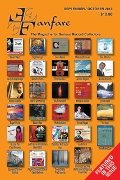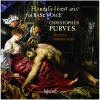Texte paru dans: / Appeared in:

Fanfare Magazine: 37:1 (09-10/2013)
Pour
s'abonner / Subscription information
Les abonnés à Fanfare Magazine ont accès aux archives du
magazine sur internet.
Subscribers to Fanfare Magazine have access to the archives of the magazine
on the net.
Hyperion
CDA67842

Code-barres / Barcode : 0034571178424 (ID269)
Consultez toutes les évaluations recensées pour ce cd
~~~~ Reach all the evaluations located for this CD
It’s a curious idea for an album. Baritone Christopher Purvis is a skillful singer, with an unmemorable voice but well-schooled technique, strong enunciation, and less than moderate agility. Despite his experience on stage, I wouldn’t call him a dramatically imaginative performer, but a smooth, likeable, and consistent one who focuses on adapting dynamics and phrasing to score his restrained but always musicianly points. Yet Handel’s bass arias often require singers who can easily manage figurations, and create distinct characters. The matchup doesn’t work out as badly as I feared it might, though by that same token it’s less than I could have hoped.
The problems with agility are apparent right away, in a moderately paced “Siblar gli angui d’Aletto” from Rinaldo. Some of the figurations are handled capably, if not comfortably, while the rest are simply smeared. This sets the stage as well for such arias as “O ruddier than the cherry,” from Acis and Galatea, and the outer sections of “Revenge, Timotheus cries,” from Alexander’s Feast.
The former of the two also points to another issue I mentioned above, that of Purvis’s reticence in realizing character. True, at around 92 bpm, this “O ruddier than the cherry” is rather faster than Ebenezer Prout’s ancient suggestion of 84 bpm—though it is no faster than most other modern versions I’ve heard. (Certainly that sadly neglected Belgian baritone Armand Crabbé was helped in making his entirely memorable 1928 recording by an even slower speed than Prout recommended.) Purvis varies the volume of a few phrases, but does nothing to point the text, much less to find the humor in the piece. For all that Bryn Terfel is faster still, he gets the lightness if not the lip-smacking sensuality of the brute Polyphemus, and has no problem with the role’s required agility.
But let’s turn next to “Revenge, Timotheus cries.” True, the figurations are smudged throughout, but the enunciation elsewhere is as clean and clear as one could wish. And the slower central section, “Behold a ghastly hand,” is sung in long phrases, with plenty of firm tone in the lower notes, a bit of metal when required, and even a brief but effective trill. A bit of clumsy phrasing on “dolce diletto” aside, “Vieni o cara” from Agrippina demonstrates similar qualities: little characterization, but a first-rate musical intelligence. As much too can be said about “To pow’r immortal” from Belshazzar, and “Tears, such as tender fathers shed” from Deborah. As long as the tempo is on the slow side, and there’s no figurations in sight, Purvis delivers oratorio-like readings of substantial quality. It helps that the small but attractive forces of Arcangelo are employed for accompaniment, and that Jonathan Cohen conducts sensitively.
In short, worth getting if you’re a fan of Purvis. Personally, I prefer Furio Zanasi and Vito Priante in this music, both possessing more theatrical flair, and ease in managing fast passagework. But there are joys to be found in this release.
Cliquez l'un ou l'autre
bouton pour découvrir bien d'autres critiques de CD
Click either button for many other reviews


